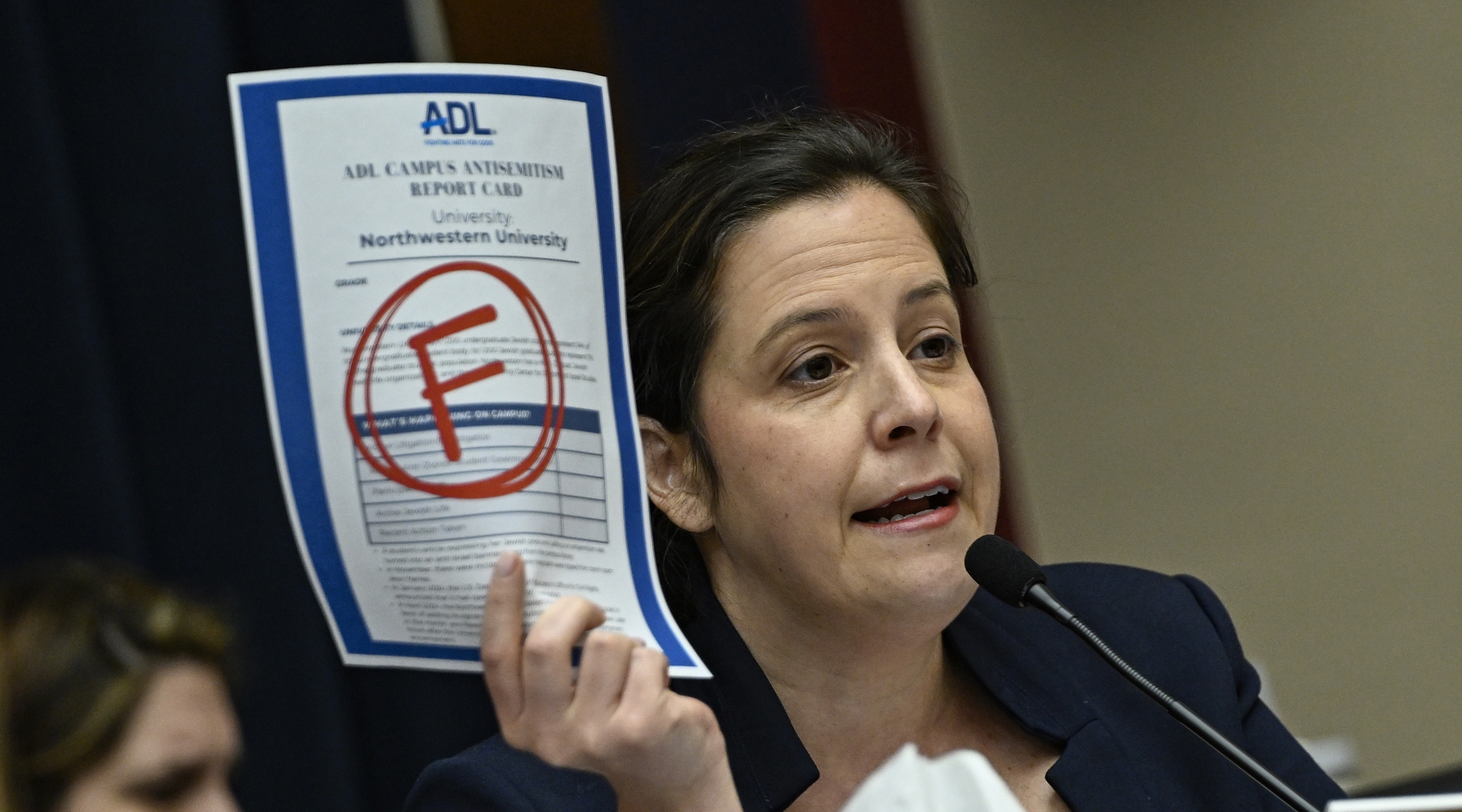ADL doubles down on its campus antisemitism report cards despite backlash
The group revised some of its scores for colleges without changing its contested approach

Rep. Elise Stefanik displays the Anti-Defamation League’s “F” campus report card grade for Northwestern as the presidents of that school, Rutgers, and UCLA testify on campus antisemitism, May 23, 2024. Photo by Celal Gunes/Anadolu via Getty Images
(JTA) — Months after Jewish students and Hillel and Chabad staff lambasted the Anti-Defamation League’s “report cards” for campus antisemitism, the group has released an updated version.
The new report cards — published this week, after nearly all schools had finished their academic year — incorporate seismic events on campus, such as the widespread and contentious pro-Palestinian encampment movement, but don’t contain major changes. Some schools went up a letter grade in how the ADL viewed their response to antisemitic incidents; others went down.
But the elements of the project that Jewish critics of the initiative challenged as deeply flawed when the grades were first published in April remain unaddressed.
Under the project, the Jewish anti-bigotry organization assigned letter grades to 85 colleges for how they have responded to campus antisemitism since Oct. 7. Criticism from students and Jewish campus professionals arrived swiftly. They took issue with everything from the criteria the ADL used to determine antisemitism, to the fact that the group did not interview Jews at the campuses it focused on, to the very idea that it was boiling down complex environments to a single letter grade.
Shira Goodman, vice president of advocacy for the ADL, told the Jewish Telegraphic Agency in April that the letter-grade system’s advantage is that it is “recognizable, it’s easily understandable.” But at the time, one Hillel professional called the grades a “massive oversimplification.” A student said her campus’ failing grade served to “paint with a very wide brush over the actual, nuanced experiences of what it actually means to be a Jewish student on college campus right now.”
The ADL has increasingly come under fire for its evolving approach to antisemitism after Oct. 7 and now faces a Wikipedia ban after editors on the site expressed concern over its reliability as a source.
In releasing its revised grades this week, the ADL said it had listened to its critics — yet opted not to meaningfully alter its methodology. Instead, the organization said, its revisions are based on actions the colleges took since receiving their initial grades, including how they responded to the encampment movement.
The new grades saw 12 schools climb up a letter while an additional three dropped down to an “F.”
“When we released the initial report card, we told universities that if we had gotten anything wrong, if they had updated information, that we would entertain it,” Goodman told JTA on Thursday. Then, she said, “the encampments started, and when we started seeing some of the incidents that were happening, some of the disruptions of campus activities, we realized that we were going to have to do a broader assessment.”
Goodman said the ADL may change its methodology for “future iterations” of the report cards, but that there wasn’t enough time to do so in this instance. “We did not have, in a month’s time period, the ability to go out in the field and put out statistically significant surveys on the 85 schools,” she said.
Princeton University, Stanford University, Wellesley College and Michigan State University were among the schools that saw their grades bumped up after taking action against their encampments this semester, or taking what the ADL deemed to be other positive actions including forming antisemitism task forces and holding “pro-Israel programming.” (Brandeis and Elon universities remain the only “A” grades on the list.)
Northwestern, Michigan and UCLA, all schools that have drawn headlines and Congressional attention for how they handled their encampments, dropped down to “F.” Northwestern’s Jewish president Michael Schill — among the first university presidents to strike a deal with encampment organizers, which was slammed by a range of Jewish critics — earned particular ire, as the ADL has taken the unusual step of calling for his resignation.
Goodman said Schill’s encampment deal was judged more harshly than deals at other schools because “it would create a precedent.” Schill has maintained, including during recent Congressional testimony, that striking a deal was the best way to keep the encampment’s antisemitism from escalating.
Michigan’s “F” grade came as the school settled an antisemitism investigation with the U.S. Department of Education; the school ultimately sent in law enforcement to clear its encampment without brokering a deal. The ADL’s description for UCLA’s rating does not mention the fact that pro-Israel counterprotesters violently attacked that school’s encampment, instead referring only to “high tensions” and “a series of violent clashes” — but it does mention a University of California graduate workers strike that was called over objections to the system’s handling of pro-Palestinian protesters.
A large number of schools were “commended” for their actions supporting Jewish students even as the ADL deigned not to change their grades; some of them, including the University of Chicago, Emory University, and Tulane, were commended specifically for having pro-Palestinian protesters arrested.
The ADL said it plans to update its grades every April and give schools one chance per year to submit “updated information” that could affect the evaluations.
















